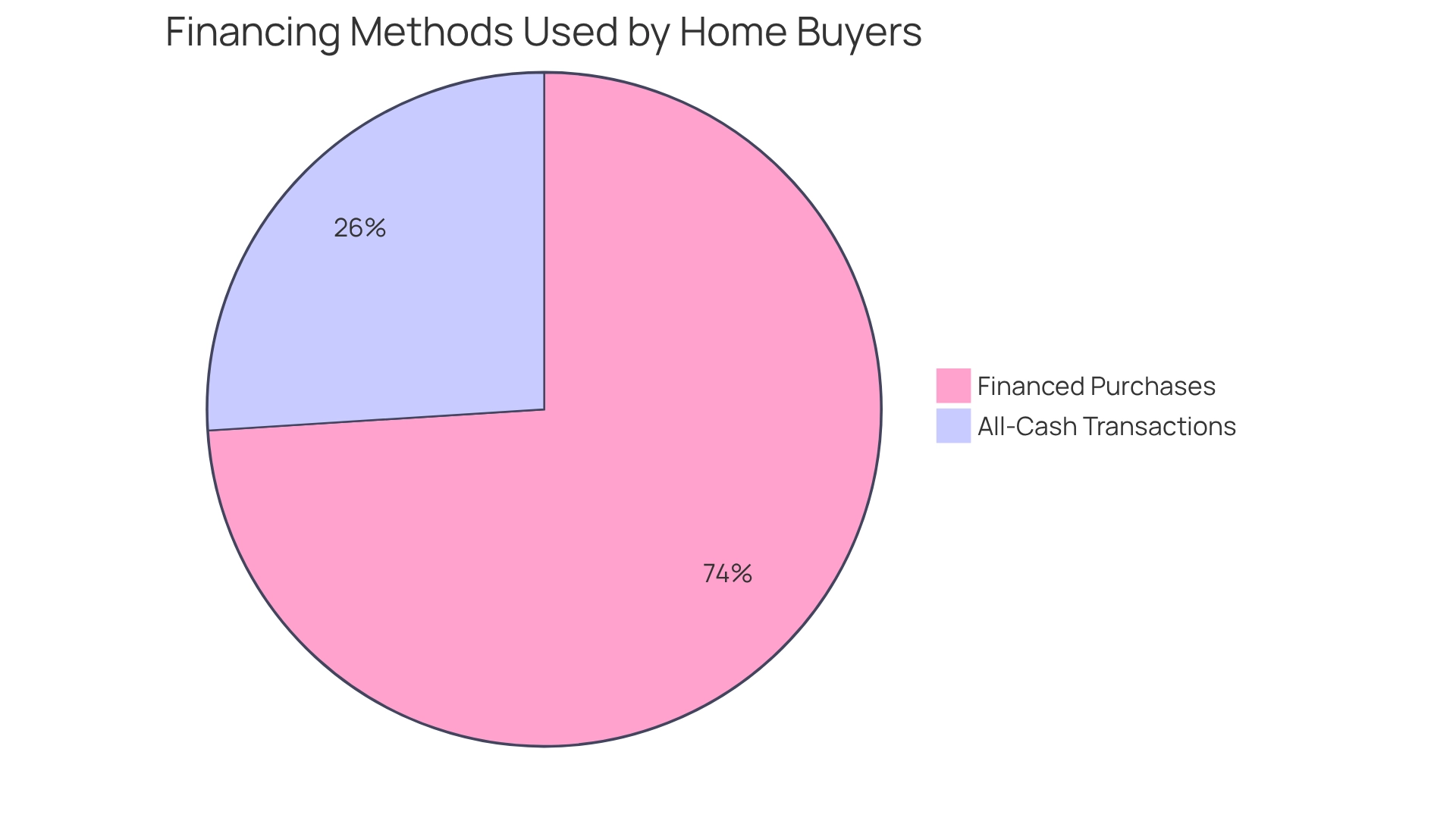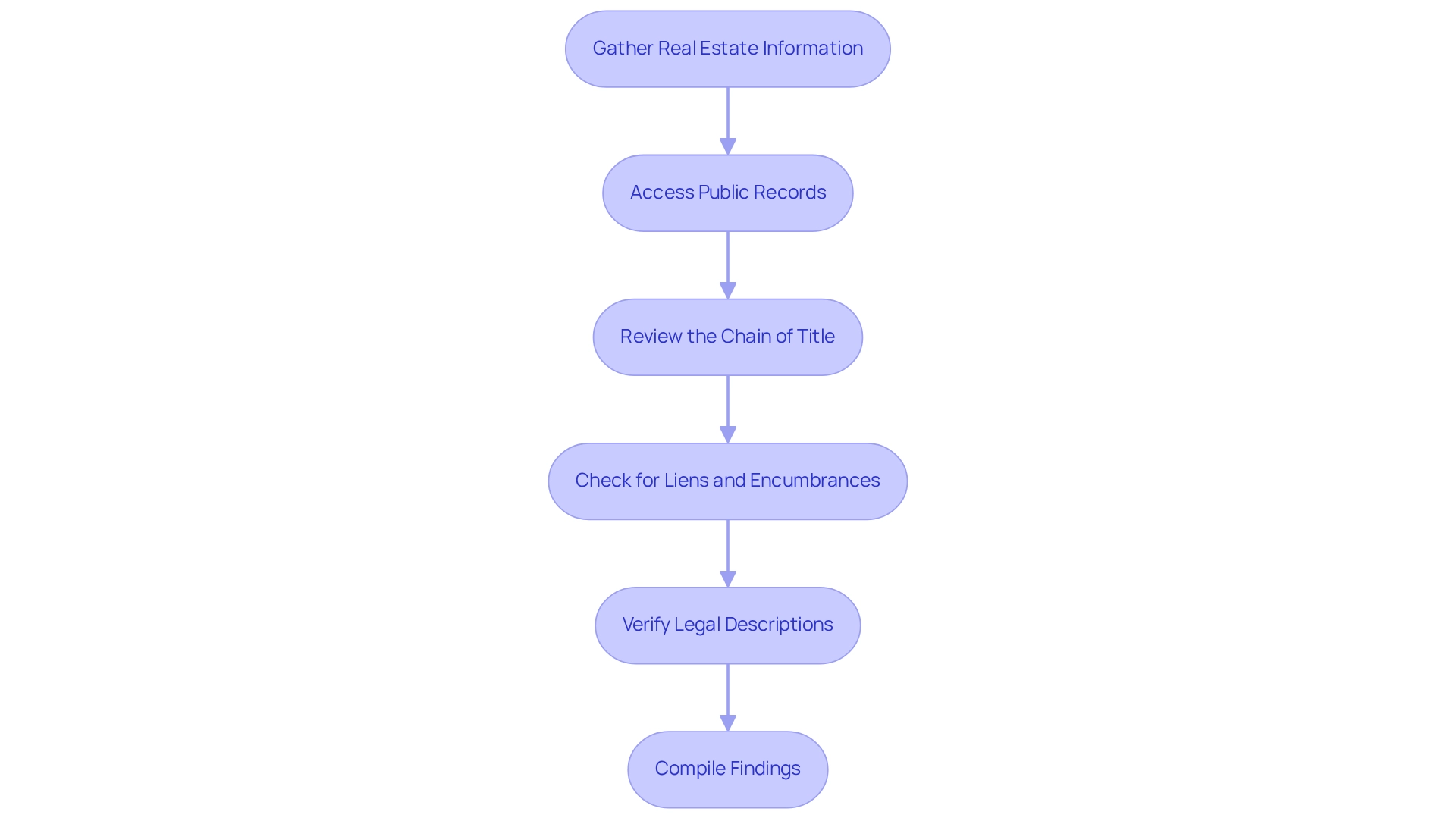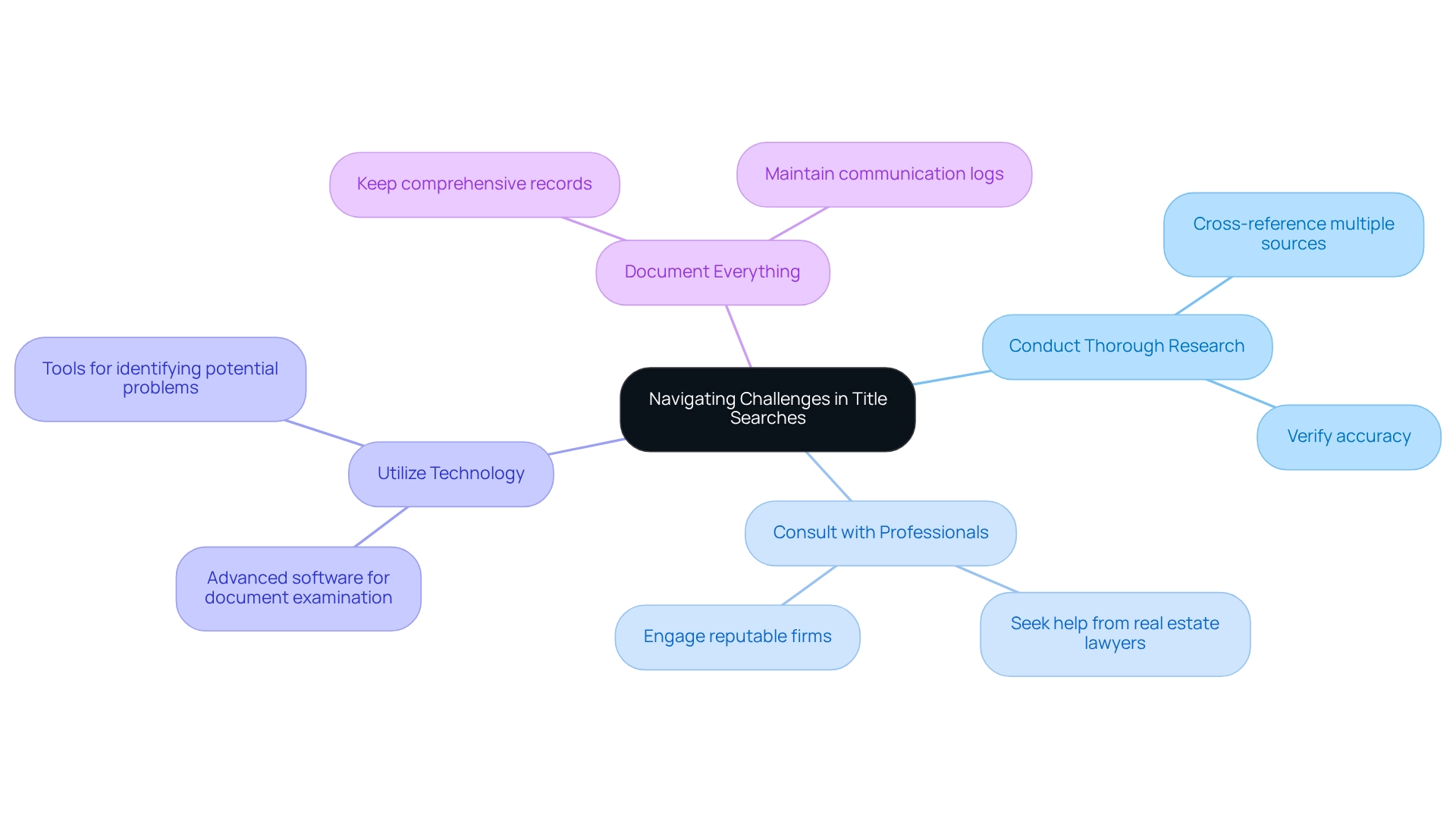Overview
To conduct a GA title search, real estate professionals must adhere to a systematic process that encompasses:
- Gathering property information
- Accessing public records
- Reviewing the chain of title
- Checking for liens
- Verifying legal descriptions
- Compiling findings
The significance of accurate title research cannot be overstated, as it ensures compliance with Georgia's legal requirements while mitigating potential risks associated with property ownership. Furthermore, the integration of advanced technologies, such as Parse AI, enhances efficiency and accuracy throughout the title search process. This approach not only streamlines operations but also reinforces the reliability of the findings, ultimately benefiting all stakeholders involved.
Introduction
In the realm of real estate, the significance of conducting a thorough title search cannot be overstated. This critical process establishes legal ownership of a property and uncovers potential claims or liens that could jeopardize a transaction. As the real estate market continues to evolve, especially in 2025, understanding the intricacies of title searches becomes essential for both buyers and professionals in the industry.
Furthermore, by delving into the legal frameworks, essential tools, and advanced technologies that streamline this process, stakeholders can mitigate risks and ensure smoother property transactions. With the integration of innovative solutions like Parse AI, the landscape of title searches is set for a transformation that promises enhanced efficiency and accuracy, consequently paving the way for a more secure real estate environment.
Understanding Title Searches: An Overview
An examination of public records is a crucial and comprehensive process aimed at determining the legal ownership of a real estate asset. This process also detects any claims, liens, or encumbrances that could affect ownership. Carrying out a thorough examination of the ownership records is essential for verifying that the seller has the legal authority to transfer rights and that the asset is free from any legal conflicts.
Ownership reviews typically include a comprehensive analysis of various documents, such as deeds, mortgages, and tax records, to establish a clear and uninterrupted chain of ownership. This diligence not only protects buyers and lenders from potential risks but also ensures compliance with legal requirements, thereby facilitating smoother property transactions. Furthermore, ownership insurance plays an essential role in this process, protecting purchasers and financiers from unexpected risks in the property market.
As we move into 2025, the significance of ownership examinations remains paramount, particularly as the property market continues to evolve. Recent trends indicate that 74% of home buyers financed their purchases, while 26% opted for all-cash transactions. These statistics emphasize the necessity for comprehensive verification of ownership to safeguard investments.
Comprehending the examination process is essential for property experts, as it greatly reduces risks associated with asset transactions.
The typical duration required for examinations in the sector can differ, but efficiency is crucial; utilizing cutting-edge technologies, like those provided by Parse AI, can expedite this procedure, enabling professionals to deliver prompt and precise outcomes. As mentioned by Inman.com, several methods can lead to success as a property agent, with an emphasis on comprehensive document reviews being one of the most effective strategies. By enhancing their reliability through thorough document examinations, real estate experts can ensure successful transactions.

Legal Framework for Title Searches in Georgia
In Georgia, the process of conducting ownership investigations is governed by specific statutes and guidelines designed to thoroughly verify real estate ownership. According to the Georgia Code, a GA title search must encompass a minimum of 50 years of ownership history. This requirement is crucial, as it aids in identifying all potential claims and liens that may affect the property, thereby safeguarding the interests of both buyers and sellers.
Real estate professionals must also familiarize themselves with the Marketable Record Title Act (MRTA), which is instrumental in simplifying the establishment of clear ownership. This act allows certain claims to be extinguished after a designated period, streamlining the verification process. Understanding the MRTA is essential, as it significantly impacts the efficiency of property examinations and the entire transaction process.
Furthermore, industry experts emphasize that the MRTA not only enhances transparency in asset ownership but also reduces the time and costs associated with title inquiries. This aligns with the substantial savings provided by modern solutions like Parse AI, compared to traditional methods.
Parse AI offers advanced machine learning tools that expedite document processing and automate title research, enabling title researchers to complete abstracts and reports more swiftly and accurately. With features such as full-text retrieval, machine learning extraction, and interactive labeling, Parse AI optimizes courthouse document processing, ensuring compliance with legal standards while enhancing efficiency. Additionally, the example manager feature allows users to annotate documents quickly, facilitating the extraction of information from extensive sets of unstructured documents.
Compliance with these legal requirements is not merely a formality; it is essential for ensuring the validity of property transactions. Neglecting these regulations can result in disputes and complications that jeopardize the interests of all parties involved. Case studies have shown that adherence to Georgia's property examination regulations has led to smoother transactions and fewer legal disputes.
Consequently, property professionals must stay updated on changes to Georgia's search regulations, particularly concerning the GA title search, and ensure their practices align with current legal standards, especially as modifications continue into 2025.
Parse AI was founded by a team of experts in energy, property, and technology, boasting over 50 years of industry experience. The founders have faced numerous challenges regarding the time and resources required to verify property ownership. By leveraging their knowledge and industry connections, along with top-tier developers, Parse AI has created a platform poised to advance the sector into the future.
Essential Tools and Resources for Title Searches
To execute an effective property examination in Georgia, real estate experts must employ a diverse array of tools and resources designed to streamline the process. Online databases, such as the Georgia Superior Court Clerks' Cooperative Authority (GSCCCA), are invaluable for accessing comprehensive real estate records, including deeds, liens, and other essential documents. The integration of advanced document lookup software can further enhance the collection of public records, significantly reducing the time required for inquiries while improving accuracy.
In addition to these digital tools, county tax assessor's offices play a crucial role by maintaining current real estate tax records, which provide insights into ownership and valuation. Local courthouses are also essential for retrieving historical documents that may not be available online, offering a deeper understanding of property history.
Awareness of these resources is vital for real estate professionals aiming to enhance the effectiveness and precision of their property investigations. With 39% of purchasers believing that investing in homes is superior to owning stocks, the importance of thorough property investigations cannot be overstated. Moreover, recent trends indicate that 74% of purchasers financed their home acquisitions in 2024, underscoring the critical role that comprehensive property searches play in securing financing.
Furthermore, purchasers typically expect to reside in properties built in 1994 for an average of 15 years, highlighting the necessity for meticulous ownership research to ensure lasting satisfaction. By leveraging the latest technology and available resources, professionals can be well-equipped to navigate the complexities of a GA title search in Georgia, aligning with Parse Ai's commitment to efficiency and accuracy.
Step-by-Step Process for Conducting a Title Search
- Gather Real Estate Information: Begin by collecting essential details about the real estate, including the address, parcel number, and the current owner's name. This foundational information will guide your inquiry.
- Access Public Records: Visit the GSCCCA website or your local county clerk's office to examine land records. Utilize the gathered information to search for pertinent documents.
- Review the Chain of Title: Investigate the history of ownership by scrutinizing past deeds and transfers. Ensure that each transfer is accurately recorded and that there are no gaps in the chain.
- Check for Liens and Encumbrances: Investigate any outstanding liens, mortgages, or other claims against the asset. This critical information is typically found within the real estate records.
- Verify Legal Descriptions: Confirm that the legal description of the property aligns with the information in the records. Discrepancies can lead to significant legal issues.
- Compile Findings: Document your findings in a clear and organized manner. This will serve as a valuable reference for future use and for any parties involved in the transaction.

Navigating Challenges in Title Searches
Title investigations often present a range of challenges that can complicate the process, including discrepancies in records, missing documents, and ambiguous legal descriptions. To effectively navigate these issues, consider the following strategies:
- Conduct Thorough Research: Cross-referencing information from multiple sources is crucial for verifying accuracy. This practice not only aids in recognizing inconsistencies but also enhances the overall dependability of the ownership search.
- Consult with Professionals: When confronted with complex legal terminology or discrepancies, seeking help from a real estate lawyer or a reputable firm can offer clarity and guidance. Their knowledge can be essential in addressing complex challenges that may occur during the inquiry.
- Utilize Technology: Embrace advanced software for document examination that can swiftly identify potential problems. Such tools improve efficiency and precision, enabling a more streamlined inquiry process.
- Document Everything: Keeping comprehensive records of your findings and all communications with involved parties is essential. This documentation acts as an essential resource in the case of conflicts, guaranteeing that you possess a thorough record of the inquiry process.
Statistics show that inconsistencies in ownership records are not rare, with a notable percentage of ownership investigations facing problems that necessitate resolution. The 2023 American Housing Survey revealed that the efficiency of the rental market remains high, with many renters finding new housing quickly. This highlights the necessity for precise property inquiries to enable quick moves, as demonstrated by the case study indicating that a significant number of tenants located new accommodation in under a month.
By applying these strategies, estate agents can effectively tackle common obstacles in asset investigations, ensuring a smoother and more dependable process.

The Role of Title Insurance in Real Estate Transactions
Ownership insurance plays a crucial role in property transactions, providing essential protection against potential flaws in a property's ownership that may elude detection during a standard ownership search. This insurance acts as a safeguard for both buyers and lenders, shielding them from financial losses arising from issues such as undisclosed liens, fraudulent claims, or inaccuracies in public records. In 2025, the significance of ownership insurance is underscored by the fact that approximately 80% of real estate transactions involve ownership insurance, signifying its widespread acceptance as an indispensable safeguard.
Understanding the specifics of ownership insurance coverage, including any exclusions, is vital for real estate professionals. By securing ownership insurance, they not only protect their clients from unforeseen ownership issues but also enhance their own credibility in the market. A recent case study highlighted how a property insurance policy safeguarded a buyer from a substantial financial loss due to a previously undisclosed lien, illustrating the tangible benefits of this coverage.
This context is particularly relevant in light of Parse AI, which addresses challenges in verifying property ownership through machine learning and optical character recognition, enabling researchers to complete their tasks more efficiently and accurately.
Furthermore, recent statistics reveal a rise in insurance claims, notably those linked to fraud and inaccuracies in public records. This trend underscores the necessity for property experts to advocate for insurance as a fundamental component of any transaction. Additionally, as population growth in U.S. metropolitan areas accelerates, the demand for real estate transactions—and consequently, the need for property ownership insurance—continues to increase.
By leveraging effective property research methods, such as those provided by Parse AI, professionals can offer their clients peace of mind, ensuring that their investments are secure against potential ownership-related challenges while also achieving significant cost savings compared to traditional property research methods.
The Future of Title Searches: Embracing Technology
The landscape of document searches is undergoing a significant transformation, driven by technological advancements, particularly the integration of machine learning and artificial intelligence. These innovations are not mere enhancements; they fundamentally change how a GA title search is performed. By automating repetitive tasks and swiftly analyzing vast datasets, these technologies can pinpoint potential issues in property records with remarkable accuracy.
For instance, AI-driven tools can efficiently search for liens and encumbrances, drastically reducing the time needed for comprehensive property investigations.
As the real estate industry increasingly adopts these technologies, professionals who embrace these changes will find themselves at a distinct advantage. Enhanced efficiency and accuracy in GA title searches not only streamline workflows but also lead to increased client satisfaction. The ongoing evolution in this domain suggests that those who leverage AI and machine learning will be better prepared to navigate the complexities of ownership verification, ultimately reshaping the future of research.
Furthermore, the property services sector is facing significant regulatory changes that could revolutionize service delivery, including the modernization of property recording systems and the regulation of remote notarization practices. These developments aim to bolster security, transparency, and data privacy in property services, which may further propel the adoption of AI and machine learning in property searches.
As highlighted by a forward-thinking leader at Orchestrate Mortgage and Title Solutions, "Our technology-driven approach is just one aspect of how we provide the highest level of service to our clients." This perspective underscores the importance of integrating advanced technologies in GA title search research.
In a broader context, California's tech employment reached 1.53 million in 2023, emphasizing the increasing significance of technology across various sectors, including real estate. Looking ahead, McKinsey estimates that quantum computing could generate up to $700 billion in value across diverse sectors by 2035, indicating that future technological advancements will continue to profoundly influence title searches.
Conclusion
The significance of conducting a comprehensive title search in real estate is paramount. This critical process not only confirms legal ownership but also uncovers any potential claims or liens that may threaten property transactions. As the market evolves, particularly in 2025, real estate professionals must grasp the legal frameworks, essential tools, and advanced technologies that facilitate title searches, thereby ensuring compliance and enhancing efficiency.
In Georgia, specific regulations govern the title search process, including the requirement to review a minimum of 50 years of ownership history. Acquaintance with laws such as the Marketable Record Title Act (MRTA) is essential for real estate professionals, as it streamlines the verification process and mitigates associated costs. Leveraging advanced platforms like Parse AI can significantly improve this process, enabling quicker and more precise title searches, which are crucial for protecting investments.
Real estate professionals should utilize a diverse array of tools and resources, from online databases to title insurance, to bolster the accuracy and efficiency of title searches. By adopting a systematic approach, addressing common challenges, and embracing technological advancements, stakeholders can navigate the complexities of property ownership verification with increased ease.
Ultimately, the adoption of innovative solutions and best practices in title searches will not only safeguard buyers and sellers but also cultivate a more secure real estate environment. The integration of technology is poised to transform the industry, making it essential for real estate professionals to remain informed and adaptable in this rapidly evolving landscape.
Frequently Asked Questions
What is the purpose of examining public records in real estate?
Examining public records is crucial for determining legal ownership of a real estate asset and detecting any claims, liens, or encumbrances that could affect ownership.
Why is it important to verify ownership records?
Verifying ownership records ensures that the seller has the legal authority to transfer rights and that the asset is free from legal conflicts, protecting buyers and lenders from potential risks.
What types of documents are analyzed during ownership reviews?
Ownership reviews typically include a comprehensive analysis of deeds, mortgages, and tax records to establish a clear and uninterrupted chain of ownership.
How does ownership insurance contribute to property transactions?
Ownership insurance protects purchasers and financiers from unexpected risks in the property market, enhancing security during transactions.
What recent trends in home buying highlight the need for ownership examinations?
Recent trends indicate that 74% of home buyers financed their purchases, while 26% opted for all-cash transactions, emphasizing the necessity for thorough verification of ownership.
What is the typical duration for ownership examinations, and how can it be optimized?
The duration for ownership examinations can vary, but utilizing technologies like Parse AI can expedite the process, enabling professionals to deliver prompt and precise outcomes.
What legal guidelines govern ownership investigations in Georgia?
In Georgia, ownership investigations must encompass a minimum of 50 years of ownership history, as per the Georgia Code, to identify potential claims and liens affecting the property.
What is the Marketable Record Title Act (MRTA) and its significance?
The MRTA simplifies the establishment of clear ownership by allowing certain claims to be extinguished after a designated period, enhancing efficiency in property examinations and transactions.
How does Parse AI improve the title search process?
Parse AI offers advanced machine learning tools that expedite document processing and automate title research, ensuring compliance with legal standards while enhancing efficiency.
Why is compliance with legal requirements essential in property transactions?
Compliance is essential to ensure the validity of property transactions; neglecting these regulations can lead to disputes and complications that jeopardize the interests of all parties involved.




